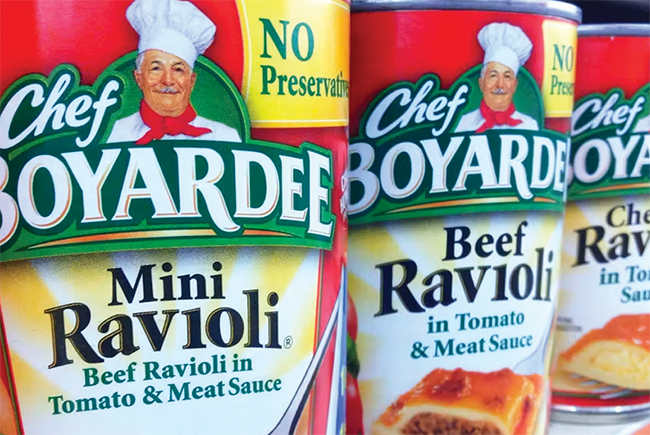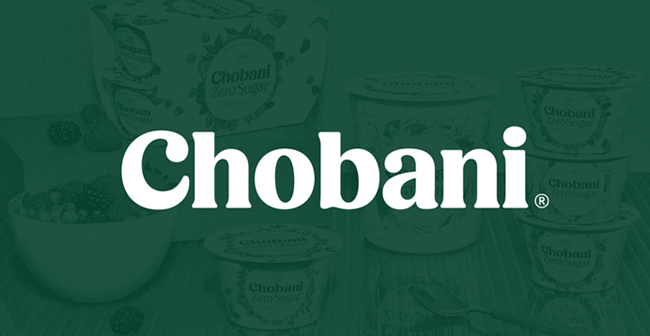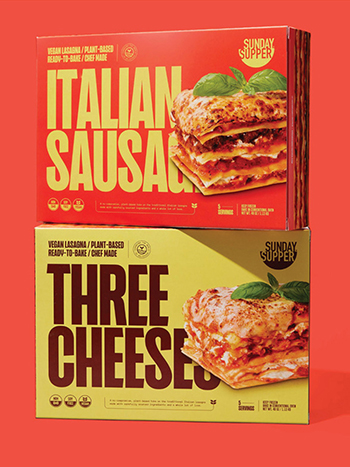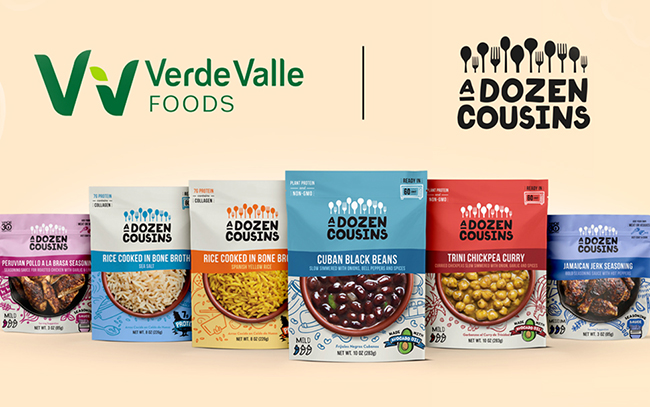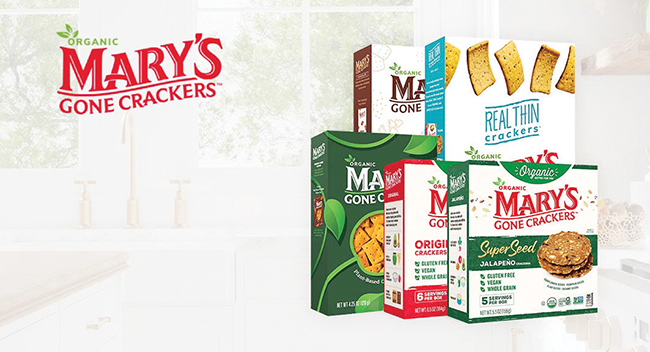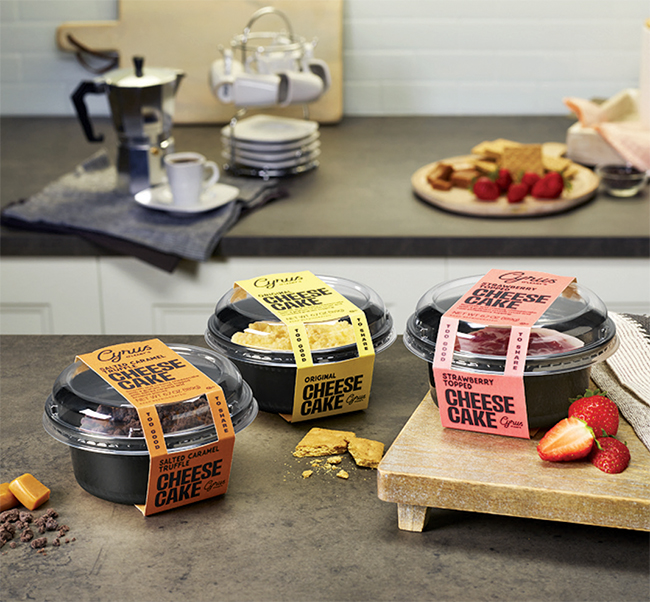NOSHscape: The Latest Food Brand News
Conagra To Sell Chef Boyardee For $600 Million
Conagra Brands is saying bye-bye to Chef Boyardee.
On May 1, the Chicago-based conglomerate announced the signing of a definitive agreement to divest the ready-to-eat pasta meals producer to Brynwood Partners-owned Hometown Food Company for $600 million in cash. The transaction is expected to close in the first quarter of the Conagra Brands’ fiscal 2026 and is subject to customary regulatory approvals.
The Chef will now be slung alongside Hometown’s other brands – including the likes of Pillsbury, Hungry Jack, Birch Benders and Arrowhead Mills. The transaction includes the brand’s Milton, Pa., manufacturing facility along with all assets and operations for its shelf-stable products.
Conagra, however, will retain control of Chef Boyardee’s frozen skillets business.
Conagra is focusing on high-fiber and high-protein offerings in its core categories as it tunes its assortment for current consumer demands, specifically around weight loss and GLP-1 use. Per its third-quarter earnings report in early April, the company saw both net sales and organic net sales drop 6.3% and 5.2%, respectively. During the full run of fiscal year 2024, the Boyardee business contributed roughly $450 million in net sales.
Now, under Brynwood’s guidance the firm’s CEO Hendrik Hartong told The Wall Street Journal it would work to “reinvigorate” the century-old shelf-stable pasta producer and bring The Chef’s items to new areas of the store.
Conagra first bought Boyardee back in 2000 through a $2.9 billion buyout of International Home Foods, which also gave it Pam cooking spray, Gulden’s mustard and Bumble Bee seafood, the latter of which it divested just three years later.
Brynwood has been an active player in the consumer products space, acquiring more than 60 brands and currently operating five food and beverage companies: Carolina Beverage Group, West Madison Foods, Great Kitchens Food Company and Miracola Pizza Company. Earlier this year, the firm sold its Harvest Hill portfolio business – which included Sunny D, Juicy Juice and others – to Guatemalan conglomerate Castillo Hermanos for nearly $1.5 billion.
Chobani ‘Entering a New Dimension’ With $1.2 Billion New York Facility
Chobani is investing $1.2 billion in a new dairy processing plant in Rome, N.Y., amidst accelerated growth.
Upon completion, the Rome facility will house up to 28 production lines to process approximately 12 million pounds of milk per day. Chobani currently purchases over a billion pounds of raw milk from New York State dairy farmers annually. Once the new facility reaches full capacity, the brand expects to purchase roughly six billion pounds per year.
Founded in 2005 by Turkish businessman Hamdi Ulukaya, Chobani got its start in Edmeston, N.Y., in a former Kraft factory. With the addition of the Rome plant, the company will operate three production plants across the U.S. and one in Australia.
“With our new plant and our original home in South Edmeston, we’re entering a new dimension, partnering with hard-working people across the heartland of New York to build an ecosystem of natural food production and nourish families throughout the country,” Ulukaya said in a press release.
Notably, the dairy industry is the largest single segment of the Empire State’s $8 billion agricultural industry. New York has nearly 3,000 dairy farms that produce 16.1 billion pounds of milk annually, making it the fifth-largest dairy state in the country.
Chobani’s new project is expected to generate more than 1,000 full-time jobs in Oneida County. To help facilitate Chobani’s investment and expansion in the Mohawk Valley, Empire State Development (ESD) has agreed to provide the company up to $73 million in performance-based Excelsior Jobs Program tax credits to support the creation of these jobs.
“Through this partnership with Chobani, we’re revitalizing upstate New York’s manufacturing sector one spoonful at a time. When I took office, I pledged to make New York the most worker-friendly and business-friendly state in the nation, and projects like this show our strategy is working,” said New York Governor Kathy Hochul in a statement.
The brand has experienced significant growth over the past few years, branching out from a yogurt business into a platform that also manufactures products like oat milk and creamers. Following its $900 million acquisition of La Colombe in 2023, the company began selling cold-pressed espresso and lattes on tap at cafés nationwide and ready-to-drink beverages at retail.
Chobani is the third-largest refrigerated oat milk brand in the U.S., representing roughly 20% of the category with dollar sales over $118 million in the 52-week period ending December 29, according to data from Chicago-based research firm Circana.
Last year, the privately held company saw sales climb 17% to $2.96 billion, reported The New York Times, and the new plant is expected to help Chobani meet “soaring” product demand and create runway for new innovations.
Sunday Supper Taps Former Good Planet Exec As CEO, Launches $2.5 Million Seed Round
Frozen plant-based Italian food producer Sunday Supper has appointed former Good Planet COO Spencer Oberg as CEO as it readies to launch a $2.5 million seed round supporting the expansion of its brick-and-mortar distribution footprint.
Additionally, the brand has named Chris Hays as CMO and Matt Williams as head of sales. Hays previously served as senior director of brand and content at Farm Sanctuary, while Williams held senior leadership positions at Tattooed Chef and Beecher’s.
“Spencer has this amazing business ethos and we’ve always had an incredible working relationship with a lot of trust. His extensive background in helping to build Good Planet made a lot of sense. It’s time to take [Sunday Supper] to the next level,” said Richard Klein, co-founder and chief brand and product officer at Sunday Supper.
Klein and Oberg first connected while Oberg was still at Good Planet, collaborating on Sunday Supper’s new Mozza Fritto appetizer, a vegan take on the mozzarella stick crafted with Good Planet’s plant-based cheese.
“When it was time for me to transition from my job over there, it seemed like a natural fit to come [to Sunday Supper] and apply the wonderful experience and expertise I had gained into building this product and brand that I’m in love with,” said Oberg. “I think the sky’s the limit.”
Founded in 2021 by Klein alongside marketing and brand communications professional Florian Radke, Sunday Supper began as a direct-to-consumer business selling plant-based Italian Sausage Lasagna on its website. Within the first two months of launch, Sunday Supper had sold nearly 3,000 lasagnas at $45, plus roughly $60 for shipping.
However, the high cost and lack of sustainability of shipping frozen food products across the country sparked a shift to brick-and-mortar retail in 2022. Sunday Supper’s first retail account was Fresh Market in the Southeast, and the brand has since grown to 600 doors nationwide, including Giant, Fresh Direct and Central Market, among others.
The Los Angeles-based brand expects to reach 1,000 doors by year’s end with a focus on natural and specialty retailers.
“We want to be hyper-focused on those channels because that’s where the main consumer is for this type of gourmet, healthy, indulgent plant-forward product,” said Oberg. “Making sure that we gain a lot of good traction there [is important] before spreading too thin in conventional and mass.”
While a number of plant-based brands lead with the fact they are plant-based, Sunday Supper has chosen to call out that its offerings are chef-crafted, making the plant-based attribute secondary. The brand partnered with award-winning Italian chef Celestino Drago to help create its final product, marking Drago’s first and only commercial food endeavor.
“We’ve seen with the consumer that [the products’] healthy, nutritious and indulgent quality attributes are resonating very well,” said Oberg. “The fact that it happens to be plant-based, vegan and dairy-free is a benefit that we see as a great way to help people eat healthier and do better for the planet without giving anything up.”
Since launch, Sunday Supper’s product portfolio has grown to seven SKUs, including the aforementioned Italian Sausage Lasagna and Mozza Fritto, Three Cheeses Lasagna, Italian Cheese Ravioli, Italian Mushroom Ravioli and Italian Baked Manicotti.
Its flagship lasagna, which contains five servings per box, is a premium product with a suggested retail price of $17.99. Sunday Supper is venturing into single-serve products to achieve greater household penetration.
“The idea of singles is to compete with brands that are solely focused on [single serves], as well as to increase trial and [drive] better margins,” said Klein.
Oberg added, “We had valuable feedback from some of the largest natural retailers suggesting [singles] would be a very good strategic move on our part and something they’d be quite interested in.”
Available in four varieties – Italian Sausage Lasagna, Three Cheeses Lasagna, Eggplant Parmesan and Fusilli Alla Vodka – the single-serve products have a more accessible price of under $10.
Additionally, the brand is rolling out a collection of appetizers – dubbed the “Frittos” line – that includes products like zucchini fries and fried ravioli in addition to the mozzarella sticks. According to Oberg, the new products fit into two key categories on which buyers are currently focused: snacking and appetizers.
“Early signs from the launch of the Mozza Fritto are proving this sentiment to be correct. [The product] has quickly become a top mover and is in high demand. It’s very early, but there are very exciting signals,” said Oberg.
Beyond retail, the brand is eyeing foodservice as a means of diversifying its revenue streams. According to Oberg, there is a “great market fit” in college and university grab-and-go sections, particularly with the new Frittos line.
To support its next stage of growth, Sunday Supper today launched a $2.5 million seed round. The two-tier round will consist primarily of funds and venture capital, with a smaller portion coming from a crowdfunding campaign.
According to Oberg, the decision to include a crowdfunding element is part of the brand’s “strong desire” to have its community share in its success. Once the seed round closes, the funds will be deployed to expand the team and grow the Sunday Supper’s distribution footprint.
“The vast majority will go into the growth aspect of making the product and getting it on shelves. We’re looking at a very significant growth year, [anticipating] 4x year-over-year growth,” said Oberg. “The future looks very bright.”
More Beans: A Dozen Cousins Locks In ‘Manufacturing and Manpower’ Via Verde Valle
Cash is hard to come by, and the future is uncertain.Just look at the earnings reports of nearly every publicly traded CPG conglomerate lately.
As Ibraheem Basir, founder and CEO of A Dozen Cousins, began to strategize his business’ next stage of growth, there was one major capability on his mind, and the route to secure it was poised to provide much more support than someone simply cutting a check.
In May, A Dozen Cousins announced its acquisition by Verde Valle Foods, the U.S. subsidiary of Verde Valle, a ready-to-eat pouched bean and Mexican meal manufacturer producer of Mexican bean and meal brand Isadora. We sat down with German Rosales, Verde Valle Foods U.S. CEO, and Basir, now general manager, to learn what potential benefits both sides saw in a business combination.
Rosales said Verde Valle has admired Los Angeles-based A Dozen Cousins virtually since its founding, but a brief encounter with Basir at Natural Products Expo West in 2024 started a conversation about the potential to collaborate. According to Basir, he was not necessarily seeking an exit, but as he assessed his business’ runway, he recognized that it needed manufacturing capacity and support.
“We always try to think about capital as a tool – like what is the funding needed to get to the next stage in the business,” Basir explained. “Sometimes that has been traditional equity, at other times it’s been debt, at other times it’s been creative terms with suppliers. We take a pretty creative approach in terms of what we do to get to the next stage. This past year what became clear to me was, what we really need is support in terms of manufacturing and manpower.”
A Dozen Cousins received early support from the Chobani Food Incubator, and it has received investment from firms including Emil Capital Partners and RCV Frontline, as well as notable CPG execs including John Foraker and Gail Peterson. As the conversation with Verde Valle evolved, and as Basir got to know the team, he said the backing of a large, legacy company was an appealing proposition.
It helped that Basir was a fan of Verde Valle’s Isadora brand as well. He recounted that just weeks before meeting the team at Expo, A Dozen Cousins had conducted an in-house competitive tasting that included Isadora’s refried black beans as part of the panel.
“We tasted Isadora and I was like, ‘Man, these are really good,’” said Basir. “Honestly, they were better than ours, which I didn’t say at the time, but I don’t feel shy admitting now.”
It became clear to Basir that the synergies and capabilities Verde Valle could provide would unlock plenty of runway for years to come. As general manager, Basir will also retain control of the brand’s day-to-day operations within Verde Valle’s larger organization, and he will continue to lead the business and its growth with the entire A Dozen Cousins team now on board at Verde Valle, per terms of the deal.
“We obviously liked the brand a lot, but we were also very excited for the opportunity to have Ibraheem join the team,” said Rosales. “That was a big part of the rationale behind the acquisition and his new title, general manager, it tells you a lot about what you need to know in terms of his decision making ability going forward.”
Long term, A Dozen Cousins plans to leverage Verde Valle’s internal manufacturing network and R&D team, which Basir said was a “big value driver” in the deal. He said that as the brand has grown over the past two years, it has not been able to thoroughly meet market demands.
“As a startup, you’re constantly fighting for line time, making sure you have enough capital to build inventory, trying to turn things around really quickly from producer to retailer,” Basir said. “As a result we’ve never felt like we fully satisfied the market demand for our products… as an entrepreneur, you spend so many years and hours trying to build a brand and a product that people want, and then once you’ve created that demand, to not be able to fully fulfill it is really one of the most frustrating feelings in the world.”
That added capacity is what Basir claims he is “most excited about,” in addition to tapping the expertise of its R&D team. He believes that the ability to “jointly imagine” new products, while also having the resources and “ability to help bring it into the world” on hand will be a major unlock for the business.
Though A Dozen Cousins will accelerate its growth in the coming year, Basir said he will maintain the thoughtful approach he has always taken when entering new retailers and markets. The brand, which currently spans beans, sauces and pouched rice products, distributes to retailers nationwide including Whole Foods Market, Sprouts, Fresh Market, Publix, Meijer, Target, Walmart, Kroger, Thrive Market, Wegmans and more.
Verde Valle remains the category leader in pouched ready-to-eat beans in Mexico, Rosales emphasized, and brought its Isadora brand to the U.S. nearly a decade ago. However, over the past year, the brand has found a new consumer base in non-Hispanic markets and is working to expand its presence across retail channels.
That’s where A Dozen Cousins comes in.
Rosales believes the brand’s strong natural retail relationships will be integral to Isadora’s growth and evolution. The two brands complement one another, he added, noting that Isadora is rooted in “authentic Mexican recipes” while A Dozen Cousins takes a unique approach to its formulations, blending flavors from Latin America, Creole and Caribbean cuisines.
“We don’t necessarily see our products competing with each other,” Rosales said. “More than half of our consumers are non-Hispanic [per Nielsen data] so we’ve now seen the opportunity to cross over Isadora to mainstream consumers. We’ve seen success last year, and so we’re very excited to expand our client base as part of a partnership with A Dozen Cousins.”
Gluten-Free Pioneer Mary’s Gone Crackers Sold to Dare Foods Subsidiary
Mary’s Gone Crackers, a manufacturer of organic gluten-free snacks founded in 2004, has been acquired by Rosseau Incorporated, a U.S.-based subsidiary of Canadian food conglomerate Dare Foods Limited.
Mary’s prior owner, legacy Japanese food business Kameda Seika Co., agreed to divest the brand in a debt equity swap, with a deal reached on April 29.
According to an April 30 filing by Kameda, Mary’s will convert a loan it received from Kameda into equity, in the amount of $60.7 million, through the debt equity swap process, which will be transferred to capital surplus. No shares will be issued.
Kameda had acquired Mary’s in 2012 as part of a strategic expansion into the U.S. market, with a goal of establishing a portfolio in the emerging better-for-you set.
However, the brand has recently “been facing challenging business conditions,” the company reported, including “soaring raw material prices” that have pushed Mary’s Gone Crackers to undergo reforms “such as improving production efficiency and launching new products.”
For its U.S. business, Kameda has opted to now focus on its TH Foods subsidiary, which it sees as an avenue to “invigorate the rice cracker products in the USA market, aiming to become a ‘Rice Innovation Company’ that maximizes the potential of rice and creates new value and new markets around the world”.
A spokesman for Mary’s Gone Crackers declined to comment on the deal, noting only that the brand is adapting to the new ownership structure.
The deal comes as Mary’s has been working to revamp its brand and grow via innovation. The company introduced a new package design earlier this year and is moving to a smaller 4 oz. pack size that is intended to lower its SRP. The brand previously reported doubling its manufacturing capacity in early 2024 and in August it brought on tech industry veteran Roger Yoder as VP of marketing and business development.
In Canada, Dare manufactures several lines of crackers and cookie brands including Bear Paws, Breaktime and Normandie.
Hain Ousts CEO, Initiates Strategic Review
For the second time in two years, Hain Celestial is once again changing its leadership team and initiating a strategic portfolio review after reporting Q3 net sales dropped 11% year-over-year to $390 million, driven by declines across all key segments with the exception of meal preparation.
The company appointed Alison Lewis as interim president and CEO, replacing Wendy Davidson. Lewis has served as an independent director on the company’s board since September 2024 and was previously CMO at Johnson & Johnson in addition to spending over 11 years at Coca-Cola, leading the Odwalla business and later serving as SVP and CMO of North America.
Following Davidson’s appointment in 2022, Hain later implemented its Hain Reimagined transformation plan; however, analysts and shareholders were hesitant about the latest turnaround effort, which also leans heavily on past initiatives to streamline operations and simplify the portfolio. Ken Goldman of JP Morgan asked executive leadership during the Q&A portion of the call “what’s different this time… we’ve heard all of it before a few times.”
Lewis, acknowledging that it is her first day on the job, offered little specificity into the new transformation effort. She instead pointed to the understanding she has derived from past experiences on “what makes the machine tick,” including a digital-first strategy, great innovation, strong revenue growth management and superior P&L management against margin accretion, with an added emphasis on gross margin and EBITDA.
“There are things that can be done differently and will be done differently as we move forward,” added Dawn Zier, chair of the board. Per, the company’s Q3 results today, there is plenty of room for improvement, particularly across its North American business.
Third quarter organic net sales declined 10% year-over-year across its North American business, contributing 80% of the “top line shortfall,” said CFO Lee Boyce on the call. Two-thirds of that decline stemmed from softness in its snack segment, Boyce added, which saw organic net sales decline of 13% year-over-year, primarily due to poor execution of Garden Veggie’s promotional strategy.
SKU rationalization, softness across its pouch business and smaller velocities across its Earth’s Best formula business contributed to a 6% organic net sales drop in Q3 year-over-year. Beverage segment organic net sales fell 7% year-over-year due to channel shifts in Europe for its non-dairy milk offerings and poor execution against its Celestial Seasonings business at the start of “hot tea season;” the brand pulled double digit velocities, but sales volume growth was offset by a temporary stocking issue at the beginning of the quarter.
The lower-than-expected results were also driven by a shortfall in pricing actions not keeping pace with the impact of trade, investment and cost inflation. Hain is preparing for the impact of tariffs by rebuilding inventory, reallocating resources and shifting some manufacturing and R&D activities but, overall, doesn’t expect impending tariffs to have a material impact.
“Most of our products are produced and sold in the same region, making us less subject to tariff impact on finished goods and cross border shipping,” Boyce said. “We have some exposure on raw materials that cannot be grown or sourced in the U.S.; however, based on what we know today, we do not expect any material cost impact in fiscal 2025 and we are actively working to mitigate any impact going forward.”
Meal preparation segment sales provided a small bright spot within Hain’s Q3 results, with organic net sales up 1% due to strength in its branded U.K. soup business and growth in U.S. yogurt.
As Hain works to improve its top line, Boyce outlined five key levers it will pull on: “simplifying our business and reducing overhead spending; accelerating renovation and innovation in our brand; implementing strategic revenue growth, management and pricing actions; driving operational productivity and working capital reduction; and finally, strengthening our digital capabilities.”
The company has already made advancements to shift and simplify distribution networks, as well as consolidating its corporate office footprint between Canada and the U.K., Boyce explained. Additionally, Hain has simplified its strategic partner network, reducing co-manufacturing partnerships by 23% and raw material and packaging vendor relationships by 13%. Further cost structure optimization efforts are expected to contribute $25 million in run rate cost savings by the second half of FY26, the company said.
“I’ve spent my career building and scaling consumer brands, and I believe Hain has many of the right ingredients to succeed… that being said we also need to be realistic about where we are today,” Lewis said. “Our third quarter results were disappointing and fell short of our expectations. We are not where we need to be, and we cannot afford to stand still. To that end, we are taking a hard look at our strategic plan to leverage what is working and address the areas in which we need to make changes.”


Receive your free magazine!
Join thousands of other food and beverage professionals who utilize BevNET Magazine to stay up-to-date on current trends and news within the food and beverage world.
Receive your free copy of the magazine 6x per year in digital or print and utilize insights on consumer behavior, brand growth, category volume, and trend forecasting.
Subscribe